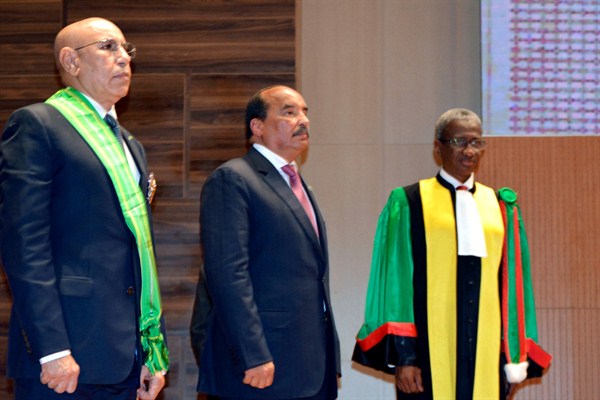When Mauritania’s ruling Union for the Republic met for its party congress in late December, it marked a new stage in the deepening rupture between President Mohamed Ould Ghazouani, who was elected last summer, and his predecessor, Mohamed Ould Abdel Aziz. The two men have gone from close associates to bitter rivals in the space of just five months. For now, Ould Ghazouani clearly has the upper hand, as the party congress made clear, when his preferred slate of candidates won the various contests for party leadership. Yet amid the two men’s rivalry, which has added a sour note to the first peaceful transfer of power between elected heads of state since Mauritania gained independence from France in 1960, the country’s wider social tensions remain acute.
Ould Ghazouani and Ould Abdel Aziz came up together through the ranks of the Mauritanian military. They served together as key senior staff to the longtime dictator Maaouya Ould Taya, who took power in 1984. Ould Ghazouani and Ould Abdel Aziz orchestrated a coup against Ould Taya in 2005, and then intervened again in 2008 after falling out with a civilian president whose election they had helped to facilitate. With this second coup, Ould Abdel Aziz became head of state, first as the head of a military junta and then, shedding his uniform for civilian garb, as an elected president in 2009. Ould Abdel Aziz won reelection in a 2014 vote that was boycotted by the opposition.
Late in his second mandate, facing term limits set by the Mauritanian Constitution, Ould Abdel Aziz and his allies explored the idea of a third-term bid. At some point in 2018, the president either decided, or was convinced, to step aside in favor of Ould Ghazouani. Trust between the comrades ran so deep, after all, that Ould Ghazouani had been in charge for a period in 2012, while Ould Abdel Aziz recuperated following a strange incident where a soldier reportedly shot him at a checkpoint. In October 2018, as preparations to engineer a handoff to Ould Ghazouani gained momentum, Ould Abdel Aziz moved his friend from the military over to a civilian post as minister of defense. A year ago, Ould Abdel Aziz announced that he would be stepping down, and put forward Ould Ghazouani as his preferred successor.

